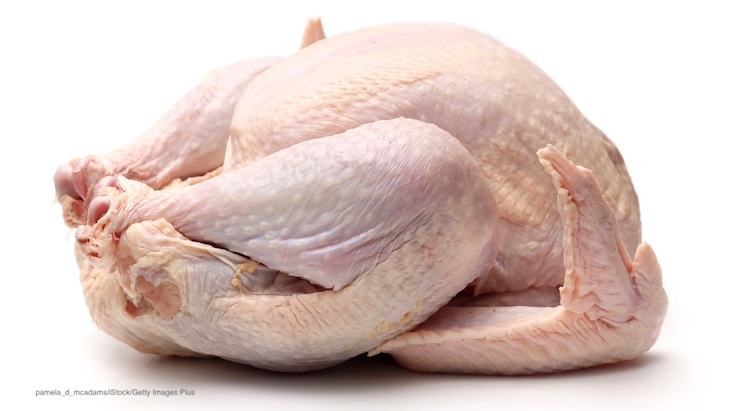The USDA is reiterating its advice about washing chicken: Don’t do it! A new study found that people are risking illness when they wash or rinse poultry.

Dr. Mindy Brashears, the USDA’s Deputy Under Secretary for Food Safety said, “Cooking and mealtime is a special occasion for all of us as we come together with our families and friends. However, the public health implications of these findings should be of concern to everyone. Even when consumers think they are effectively cleaning after washing poultry, this study shows that bacteria can easily spread to other surfaces and foods. The best practice is not to wash poultry.”
The observational study found how easily bacteria can be spread when surfaces are not effectively cleaned and sanitized. Rinsing poultry under running water aerosolizes the bacteria, spreading it up to three feet around the faucet.
In the study, participants who ached their raw poultry, 60% had bacteria in the sink when they finished the task. And 14% of those sinks still contained bacteria after the sink was cleaned. And 26% of participants who washed raw poultry transferred bacteria from the poultry to their salads.
Even scarier: when participants did not wash the poultry, they still got bacteria from raw poultry onto salad lettuce. This high rate of cross-contamination is likely due to ineffective handwashing and contamination of the sink and utensils.
Besides following the advice of don’t wash that chicken, there are three ways to make sure the food you prepare is as safe as possible:
- Prepare foods that are served without cooking, such as ready-to-eat foods, vegetables, fruits, and salads, before handling and preparing raw meat and poultry.
- Clean and sanitize ANY surface that may have touched or been contaminated from raw meat and poultry or their juices.
- And kill bacteria by cooking meat and poultry to safe final internal temperatures, WITH a food thermometer. Steaks, roasts, and chops are safe at 145°F with a 5 minute rest time. Ground meats should be cooked to 160°F. And all poultry, whole or ground, should be cooked to 165°F.
People should also know that washing, rinsing, or brining meat and poultry using salt water, vinegar, or lemon juice does not kill bacteria. When you handle raw meats and poultry, aways wash your hands for 20 seconds, then dry with a clean kitchen towel or fresh paper towel.




